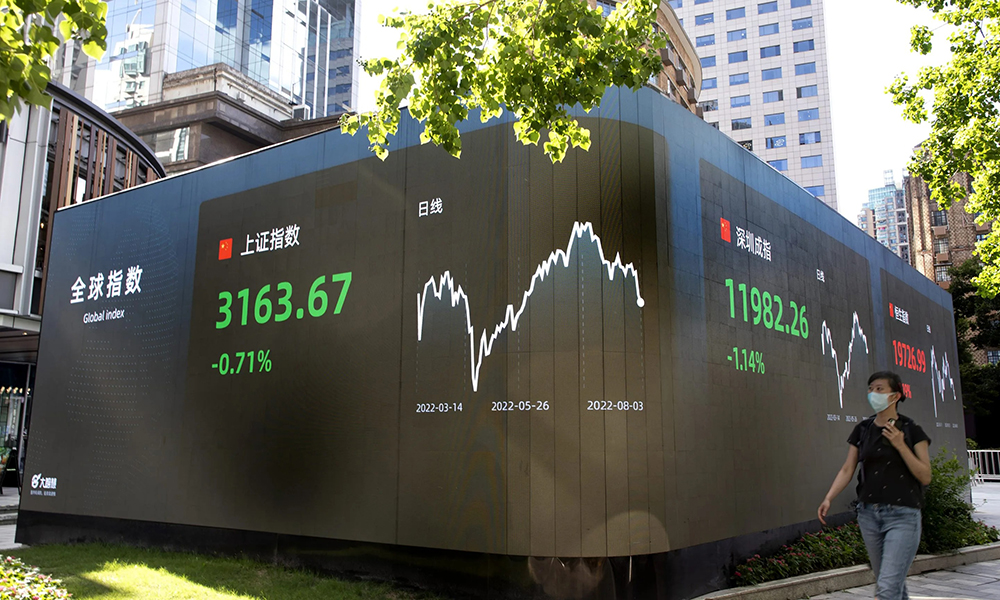末法时代,全球妖股横行

美国媒体将尚乘数科(AMTD Digital)称为“网红股”,因为这家公司的股票在7月IPO之后迅速上涨15,000%。
但中国投资者对这类股票有一个特别的称呼:“妖股”,这类股票的走势与整体市场趋势不一致,其上涨和下跌与公司基本面没有太大关系。这个术语的出现早于“网红股”,可以追溯到中国2015年的上一次散户投资热。当投资者怀疑一家公司的股价暴涨可能是源于市场操纵而不是业务改善或社交媒体上的过度繁荣时,也会用“妖股”形容这类股票。
“Demon” is the English translation of the first Chinese character in the phrase “妖股,” which refers to things that cannot be explained, like a rapid increase in stock prices.
“妖股”中的“妖”是指无法解释的事情,例如股价的快速暴涨。
最近,妖股这个词经常被提及。
香港互联网公司尚乘数科7月15日在纽约证券交易所(New York Stock Exchange)上市,在短短几周内股价暴涨15,000%。该公司的市值一度超越中国电商巨头阿里巴巴(Alibaba)。
目前,尚乘数科的股价较8月2日的最高点已经下跌了71%,估值缩水了1,000亿美元。但其交易价格依旧是IPO价格的46倍,且估值远高于IBM、Paypal和SAP等老牌科技公司。尚乘数科2021年收入2,500万美元,而IBM的营收高达574亿美元。
包括公司本身在内,没有人知道其股价为何会有这样出色的表现。在所谓致投资者的感谢信中,公司称“自公司IPO以来,没有任何重大情况、事件或与公司业务和经营有关的其他事务”,可以解释股价暴涨的原因。
另外一家中国金融公司智富融资(Magic Empire Global)上周五上市后,股价暴涨5,800%,因股价波动触发了多次交易停牌。
2月,中国建筑公司汇通建设(Huitong Construction)的股价在上海证券交易所上涨近600%,公共汽车制造商中通客车(Zhongtong Bus)的股价在5月至7月期间上涨了590%。
与新冠疫情关联的股票同样被称为“妖股”,其表现均跑赢大盘。去年,天津一家小型医疗公司九安医疗(Andon Health)的股价在深圳证券交易所上涨560%,部分原因是该公司在2021年1月与美国陆军签署了供应家用新冠检测试剂的协议。
中国金融博主路道音(音)对《南华早报》表示,妖股通常是“小盘股,发行价低于20元”,或不足3美元。路表示,这些公司“必须契合最新、最热门的话题”,类似于美国的网红股。
官方统计数据显示,中国股票市场上散户占绝大多数,散户交易占总交易量的70%。相比之下,纽约梅隆银行(BNY Mellon)的数据显示,散户交易者仅占美国股票交易的25%。
汇丰银行(HSBC)首席亚洲股票策略师、《从零开始了解亚洲股市》(Asia’s Stock Markets From the Ground Up)一书的作者赫勒尔德·范·德尔·林德表示:“散户一直是中国股市的主力。直到最近,中国股市才出现国内机构投资者。”
范·德尔·林德表示:“散户的主导地位可能带来截然不同的市场动态,包括妖股的出现。”
中国散户可能由于中国股票市场的惰性,而被妖股所吸引。跟踪上海证交所上市的所有股票的上证综合指数(SSE Composite Index)在过去12个月下跌了7.7%,过去五年几乎没有上涨。跟踪500家深圳上市公司的深圳综合指数去年下跌18%,在过去五年仅上涨了20%。相比之下,标普500指数在过去12个月下跌6.5%,过去五年上涨了70%。
但清华大学五道口金融学院副院长张晓燕告诉《南华早报》,中国散户投资者“金融素养有限”。缺乏经验可能导致他们容易成为市场操纵和欺诈的受害者,例如炒高抛售等手段。
2021年初,美国散户投资者受到社交媒体和WallStreetBets子论坛等论坛的刺激,蜂拥投资游戏驿站(Gamestop)和AMC影院(AMC Cinemas)等股票。这些“网红股”的股价上涨超过1,500%,令对冲基金、股票分析师和监管部门迷惑不解。
随着股市整体下滑,以及美联储(U.S. Federal Reserve)加息促使人们纷纷选择更安全的避险资产,网红股热潮在美国已经基本消退。游戏驿站和AMC影院的股价分别较去年的最高点下跌了50%和60%(但依旧比2021年的发行价高10倍。)摩根士丹利(Morgan Stanley)估计,散户投资者在网红股繁荣时期的收益已经损失殆尽。(财富中文网)
译者:刘进龙
审校:汪皓
美国媒体将尚乘数科(AMTD Digital)称为“网红股”,因为这家公司的股票在7月IPO之后迅速上涨15,000%。
但中国投资者对这类股票有一个特别的称呼:“妖股”,这类股票的走势与整体市场趋势不一致,其上涨和下跌与公司基本面没有太大关系。这个术语的出现早于“网红股”,可以追溯到中国2015年的上一次散户投资热。当投资者怀疑一家公司的股价暴涨可能是源于市场操纵而不是业务改善或社交媒体上的过度繁荣时,也会用“妖股”形容这类股票。
“Demon” is the English translation of the first Chinese character in the phrase “妖股,” which refers to things that cannot be explained, like a rapid increase in stock prices.
“妖股”中的“妖”是指无法解释的事情,例如股价的快速暴涨。
最近,妖股这个词经常被提及。
香港互联网公司尚乘数科7月15日在纽约证券交易所(New York Stock Exchange)上市,在短短几周内股价暴涨15,000%。该公司的市值一度超越中国电商巨头阿里巴巴(Alibaba)。
目前,尚乘数科的股价较8月2日的最高点已经下跌了71%,估值缩水了1,000亿美元。但其交易价格依旧是IPO价格的46倍,且估值远高于IBM、Paypal和SAP等老牌科技公司。尚乘数科2021年收入2,500万美元,而IBM的营收高达574亿美元。
包括公司本身在内,没有人知道其股价为何会有这样出色的表现。在所谓致投资者的感谢信中,公司称“自公司IPO以来,没有任何重大情况、事件或与公司业务和经营有关的其他事务”,可以解释股价暴涨的原因。
另外一家中国金融公司智富融资(Magic Empire Global)上周五上市后,股价暴涨5,800%,因股价波动触发了多次交易停牌。
2月,中国建筑公司汇通建设(Huitong Construction)的股价在上海证券交易所上涨近600%,公共汽车制造商中通客车(Zhongtong Bus)的股价在5月至7月期间上涨了590%。
与新冠疫情关联的股票同样被称为“妖股”,其表现均跑赢大盘。去年,天津一家小型医疗公司九安医疗(Andon Health)的股价在深圳证券交易所上涨560%,部分原因是该公司在2021年1月与美国陆军签署了供应家用新冠检测试剂的协议。
中国金融博主路道音(音)对《南华早报》表示,妖股通常是“小盘股,发行价低于20元”,或不足3美元。路表示,这些公司“必须契合最新、最热门的话题”,类似于美国的网红股。
官方统计数据显示,中国股票市场上散户占绝大多数,散户交易占总交易量的70%。相比之下,纽约梅隆银行(BNY Mellon)的数据显示,散户交易者仅占美国股票交易的25%。
汇丰银行(HSBC)首席亚洲股票策略师、《从零开始了解亚洲股市》(Asia’s Stock Markets From the Ground Up)一书的作者赫勒尔德·范·德尔·林德表示:“散户一直是中国股市的主力。直到最近,中国股市才出现国内机构投资者。”
范·德尔·林德表示:“散户的主导地位可能带来截然不同的市场动态,包括妖股的出现。”
中国散户可能由于中国股票市场的惰性,而被妖股所吸引。跟踪上海证交所上市的所有股票的上证综合指数(SSE Composite Index)在过去12个月下跌了7.7%,过去五年几乎没有上涨。跟踪500家深圳上市公司的深圳综合指数去年下跌18%,在过去五年仅上涨了20%。相比之下,标普500指数在过去12个月下跌6.5%,过去五年上涨了70%。
但清华大学五道口金融学院副院长张晓燕告诉《南华早报》,中国散户投资者“金融素养有限”。缺乏经验可能导致他们容易成为市场操纵和欺诈的受害者,例如炒高抛售等手段。
2021年初,美国散户投资者受到社交媒体和WallStreetBets子论坛等论坛的刺激,蜂拥投资游戏驿站(Gamestop)和AMC影院(AMC Cinemas)等股票。这些“网红股”的股价上涨超过1,500%,令对冲基金、股票分析师和监管部门迷惑不解。
随着股市整体下滑,以及美联储(U.S. Federal Reserve)加息促使人们纷纷选择更安全的避险资产,网红股热潮在美国已经基本消退。游戏驿站和AMC影院的股价分别较去年的最高点下跌了50%和60%(但依旧比2021年的发行价高10倍。)摩根士丹利(Morgan Stanley)估计,散户投资者在网红股繁荣时期的收益已经损失殆尽。(财富中文网)
译者:刘进龙
审校:汪皓
U.S. media outlets called AMTD Digital, whose shares surged by as much as 15,000% shortly after its July IPO, a “meme stock.”
But Chinese investors called it something else: a “demon stock,” or a stock that’s bucking overall market trends and whose rise and fall may have little to do with a company’s fundamentals. The term is much older than “meme stocks,” dating back to the country’s last retail investor boom in 2015. It’s also used when investors suspect a company’s price surge is perhaps caused by market manipulation, rather than business improvements or social media exuberance.
The term is getting a lot of use lately.
Shares in AMTD Digital, a Hong Kong–based internet company, surged by as much as 15,000% in the weeks following its July 15 IPO on the New York Stock Exchange. At times, the company’s valuation was enough to overtake Chinese e-commerce giant Alibaba.
The stock has now sunk by 71% from its Aug. 2 peak, losing as much as $100 billion in value. But shares are still trading at 46 times the IPO price, and its valuation is still greater than that of tech stalwarts like IBM, Paypal, and SAP. AMTD Digital reported $25 million in revenue for 2021, compared to IBM’s $57.4 billion.
No one, including the company itself, knows why AMTD Digital’s shares are performing so well. In a so-called thank-you note to investors, the company said there are “no material circumstances, events, nor other matters relating to our company’s business and operating activities since the IPO date” that would explain the surge in prices.
Another China-based company, financial firm Magic Empire Global, surged 5,800% after its debut on Friday, requiring multiple trading halts for volatility.
Chinese construction firm Huitong Construction rose almost 600% on the Shanghai Stock Exchange in February, while bus manufacturer Zhongtong Bus surged by as much as 590% between May and July.
Stocks connected to COVID-19 are also getting the “demon stock” label for beating the markets. Andon Health, a small Tianjin medical company, rose 560% on the Shenzhen Stock Exchange over the past year, in part due to signing a deal with the U.S. Army to provide at-home COVID tests in January 2021.
A demon stock is “usually a small cap with a relatively low starting price of below 20 yuan,” or just under $3, Lu Daoyin, a Chinese financial blogger, told the South China Morning Post. These companies “must align with the latest and hottest topics,” much like meme stocks in the U.S., says Lu.
Retail investors make up the vast majority of trading on Chinese equity markets, accounting for 70% of total trades, according to official statistics. By comparison, retail traders make up 25% of all U.S. equity trading, according to data from BNY Mellon.
“Retail investors were traditionally the backbone of the stock markets in China,” says Herald van der Linde, chief Asia equity strategist for HSBC, and author of Asia’s Stock Markets From the Ground Up. “Only recently have domestic institutional investors emerged.”
The dominance of retail investors can lead to very different market dynamics, “including the emergence of ‘demon’ stocks,” says van der Linde.
Chinese retail investors may be drawn to demon stocks due to the sluggishness of China’s equity markets. The SSE Composite Index, which tracks all the stocks trading on the Shanghai Stock Exchange, is down 7.7% over the past 12 months, and has logged almost no gains over the past five years. The Shenzhen Component Index, which tracks 500 Shenzhen-traded companies, is down 18% over the past year, and only up 20% over the past five years. The S&P 500, by comparison, is down 6.5% over the past twelve months, and up 70% over five years.
But Chinese retail traders “have limited financial literacy,” Zhang Xiaoyan, associate dean at Tsinghua University, told the SCMP. That lack of experience could leave them prey to market manipulation and scams, such as pump-and-dump schemes.
In early 2021, U.S. retail investors, spurred on by social media and forums like the WallStreetBets subreddit, flocked to companies like Gamestop and AMC Cinemas. Prices in “meme stocks” surged by over 1,500%, confounding hedge funds, stock analysts and regulators.
The meme stock frenzy has largely faded in the U.S., amid a broader slump in markets and a flight to safer assets due to the U.S. Federal Reserve’s interest rate hikes. Shares in Gamestop and AMC Cinemas are down 50% and 60% from their peaks last year (though they are still trading at prices 10 times higher than they were at the beginning of 2021). Morgan Stanley estimates that retail traders have now lost all of their gains from the meme stock boom.













